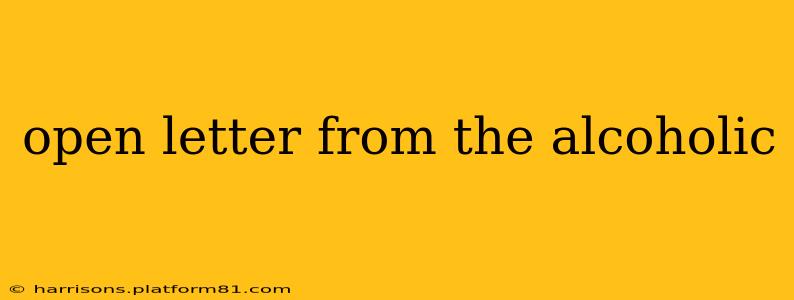An Open Letter from the Alcoholic: A Journey of Shadows and Light
This isn't a sob story, nor is it a plea for pity. It's an honest attempt to bridge the chasm of misunderstanding that often surrounds alcoholism. I'm writing this as an alcoholic, not just as a person struggling with addiction, but as someone who lives within the complex web it weaves. My experience is my own, but the feelings, the struggles, the almost unbearable weight – these are shared by countless others.
This isn't a confession, but a conversation starter. A way to shed light on the insidious nature of a disease often misconstrued as a character flaw or a simple lack of willpower.
What it Feels Like: More Than Just a Drink
Many people believe alcoholism is simply about drinking too much. That's a vast oversimplification. It's about a relentless craving, a gnawing emptiness that only alcohol seems to temporarily fill. It's about the distorted perception of reality, the loss of control, the spiraling self-destruction that feels utterly inescapable. It's the constant internal battle between the person I want to be and the person alcohol forces me to become.
Why Do People Think it's a Choice? (A Frequently Asked Question)
This is a question I grapple with myself, and it’s one that fuels so much of the stigma surrounding alcoholism. It’s not a choice to develop the disease, just as it's not a choice to develop diabetes or cancer. Alcoholism is a complex interplay of genetic predisposition, environmental factors, and psychological vulnerabilities. The choice lies in whether or not to actively seek help, but the underlying disease is not a simple act of will.
What Are the Signs I Should Look Out For? (Another Common Question)
The signs are often subtle at first. Perhaps an increasing tolerance for alcohol, meaning it takes more to achieve the desired effect. Maybe there's a growing reliance on alcohol to cope with stress or difficult emotions. The pattern of drinking might shift, becoming more frequent or heavier. Secretive behavior around drinking is another significant red flag, along with neglecting responsibilities or relationships due to alcohol consumption. Withdrawal symptoms upon attempting to stop are a serious indicator requiring professional help.
Is There Hope for Recovery? (A Question That Burns With Urgency)
Absolutely. Recovery is a journey, not a destination, a continuous process of self-discovery and growth. It’s fraught with setbacks and challenges, but the rewards – the chance to reclaim your life, rebuild relationships, and rediscover your true self – are immense. This path often involves therapy, support groups like Alcoholics Anonymous (AA), medication, and a strong support network. It demands honesty, perseverance, and a profound commitment to change.
What Can Others Do to Help? (A Crucial Question for Loved Ones)
Understanding and compassion are crucial. Avoid judgment and shaming; these only serve to isolate and further damage the individual. Instead, offer support, encourage professional help, and be patient. Educate yourself on alcoholism, its complexities, and effective ways to support someone in recovery. Remember, you can't force someone to get help, but you can offer a lifeline of unconditional support.
This letter isn't a complete picture of my journey, or the journeys of countless others battling this disease. It’s a glimpse into the darkness, a testament to the struggles, and a hopeful whisper of the light at the end of the tunnel. If you're struggling, or you know someone who is, please reach out. Help is available. You are not alone.
